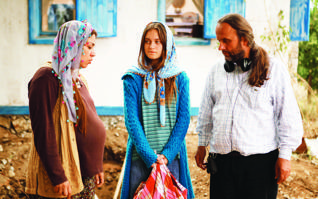Films tackle honor killings
EMRAH GÜLER ANKARA - Hürriyet Daily News

The film focuses on honor killings in Turkey, which, have always been a major problem in Turkey, especially in the rural areas of eastern and southeastern Turkey.
According to numbers released by a rights organizations and compiled from the press, about one
woman every day was killed by a family member, husband, ex-husband or partner in Turkey last year.
Government figures are even more drastic, suggesting murders of women have increased ten-fold in the last decade, from 66 in 2002 to around 1,000 each year over the last few years. Thousands are victims of the cultural and social oxymoron of “honor killings.”
Honor killings have always been a major problem in Turkey, especially in the rural areas of eastern and southeastern Turkey. Until quite recently, Turkish law tended to be lenient to honor killers, with many sentences reduced through claims of “provocation.” Thanks to women’s NGOs, devoted followers of the problem in the media, and the country’s quest to enter the European Union, honor killings were deemed a scarlet letter against Turkey, eventually leading to the introduction of a mandatory life sentence for those found guilty of the crime seven years ago.
Unfortunately, visibility, change and an adamant stance towards change do not seem to have helped much, as honor killings continue to hover as a sinister threat over the women (and men) of Turkey.
Campaigning has at least managed to transform honor killings from an accepted practice into a cultural shame, with a couple of feature movies on the subject being released each year.
Ateşin Düştüğü Yer (Where the Flame Falls), released in cinemas this week, is a harrowing look at honor killings, considering the medieval tradition from the eyes of both the unsuspecting victim and the family willing to take the life of their daughter in cold blood.
 A companion film to ‘Bliss’
A companion film to ‘Bliss’At the beginning of the film, the 17-year-old Ayşe (Elifcan Ongurlar) is taken to hospital, where her family finds out that she not only has a heart condition, but is also pregnant. As the tradition goes, a “family council” of the elders and the men in the family is called to decide the fate of a young woman who has shamed the family name. The decision is unanimous: Ayşe is to be executed. The patriarch of the family Osman (Hakan Karahan), the father of five including Ayşe, is given the job of killing his daughter. Adamant not to reveal the father of her baby, Ayşe is taken by Osman on a journey from the southwestern coast of Turkey to Konya – the latter ironically being the home of the 13th century Sufi mystic Rumi, an overarching figure who symbolizing acceptance, compassion, and unconditional love.
The film takes the form of a road
movie, in which the opposing forces of love for a child and an urgency to kill the one who has brought inexcusable shame upon the family tear Osman apart. The journey becomes the first opportunity where father and daughter can connect, where Osman sees the woman Ayşe is blossoming into.
Ateşin Düştüğü Yer is the final film of a trilogy in which director and writer İsmail Güneş explored societal tragedies like torture and systematic violence of the state against its people, as well as personal tragedies like broken families and cancer. The final film in the trilogy cements Güneş’s excellence as a filmmaker, a powerful meditation on the mechanisms and the state-of-mind that turns fathers into slayers.
The film will remind many of another movie, a box office hit of 2007 and a popular DVD, Mutluluk (Bliss).
Directed by Abdullah Oğuz and adapted from internationally-acclaimed writer Zülfü Livaneli’s novel of the same name, Mutluluk was also an unconventional road movie, where the executioner of the
honor killing and a condemned young woman go on a journey of self-discovery.
Mutluluk was another powerful film shining a light on women’s status in Turkey and the complicated dynamics of sexual and familial relations. It showed how ideas of virtue and honor can be as scary for men as they are for women, as well as the indifference of the urban intellectual to class differences. A sincere film, with no blatant messages, Mutluluk is the perfect companion piece to Ateşin Düştüğü Yer.
violance,

 A companion film to ‘Bliss’
A companion film to ‘Bliss’